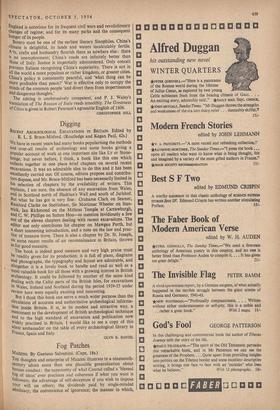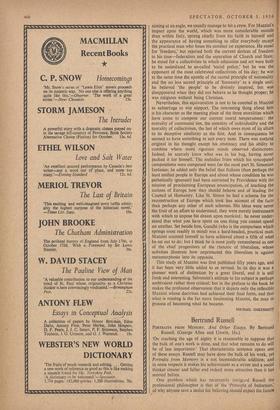Fog Patches
MAzziNi. By Gaetano Salvemini. (Cape, 18s,) THE thoughts and enterprise of Mazzini illustrate in a nineteenth- century idiom more than one plausible generalisation about human conduct : the superiority of what Conrad called a 'blessed fog of ideas' over precision and coherence if what you want is followers; the advantage of self-deception if you wish to impose Your will on others; the dividends paid by single-minded obstinacy; the convenience of ignorance; the manner in which,
aiming at an eagle, we usually manage to hit a crow. For Mazzini's impact upon the world, which was more considerable outside than within Italy, sprang chiefly from his faith in himself and the appearance of having something to offer everybody except the practical man who bases his conduct on experience. He stood for 'freedom,' but rejected both the current devices of freedom in his time—federalism and the separation of Church and State; he stood for a collectivism in which education and art were both to be assimilated to so-called 'social policy,' but he was the opponent of the most celebrated collectivists of his day; he was at the same time the apostle of the sacred principle of nationality and the no less sacred principle of 'humanity' as a single unit; he believed 'the people' to be divinely inspired, but was disappointed when they did not behave as he thought proper; be was religious without being Christian.
Nevertheless, this equivocation is not to be counted in Mazzini as subterfuge to win support. The interesting thing about him is his character as the meeting place of the three moralities which have come to compose our current moral temperament: the morality of communal ties, the morality of individuality and the morality of collectivism, the last of which owes most of its allure to its deceptive similarity to the first. And in consequence he seemed to have something to suit every taste. There was nothing original in his thought except his obstinacy and his ability to combine where more rigorous minds observed distinctions. Indeed, he scarcely knew what was in his bag, having never packed it for himself. The melodies from which his syncopated compositions were composed were for the most part St. Simonian fantasies; he added only the belief that Italians (then perhaps the least unified people in Europe and about whose condition he was pathetically ignorant) had been entrusted by Providence with the mission of proclaiming European emancipation, of teaching the nations of Europe how they should behave and of leading the Council of Humanity. Like St. Simon he had a scheme for the reconstruction of Europe which took less account of the facts than perhaps any other of such schemes. His ideas were never the fruit of an effort to understand; they were merely instruments with which to impose his dream upon mankind: he never under- stood that what you have spent on one thing you cannot spend on another. Set beside him, Gandhi (who is the comparison which springs most readily to mind) was a hard-headed, practical man. Mazzini counted himself to have achieved about a fifth of what he set out to do; but I think he is most justly remembered as one of the chief progenitors of the rhetoric of liberalism, whose activities illustrate how unprotected this liberalism is against metamorphosis into its opposite.
This study of Mazzini was first published fifty years ago, and it has been very little added to or revised. In its day it was a pioneer work of distinction by a great liberal, and it is still fresh and interesting. Salvemini's attitude to his subject is perhaps ambivalent rather than critical; but in the preface to the book he makes the profound observation that it depicts only the inflexible Mazzini whose doctrines had achieved their final form, and that what is missing is the far more fascinating Mazzini, the man in process of becoming what he became.
MICHAEL OAKE,SHOTT



















































 Previous page
Previous page